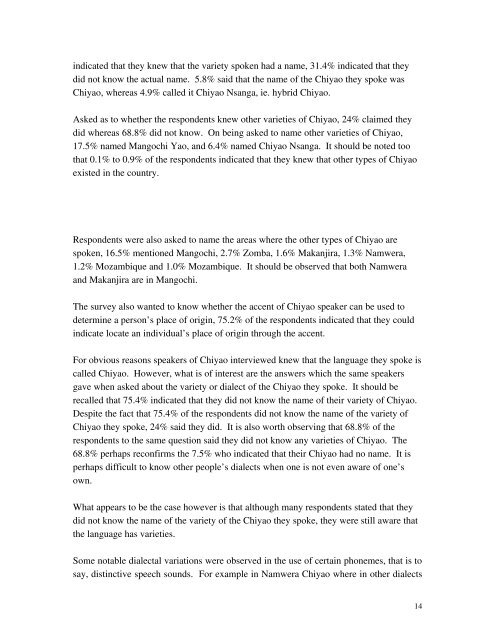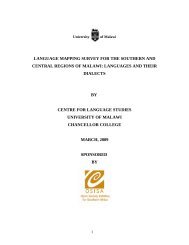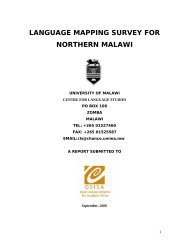SOCIOLOLINGUISTIC SURVEYS - Centre for Language Studies
SOCIOLOLINGUISTIC SURVEYS - Centre for Language Studies
SOCIOLOLINGUISTIC SURVEYS - Centre for Language Studies
Create successful ePaper yourself
Turn your PDF publications into a flip-book with our unique Google optimized e-Paper software.
indicated that they knew that the variety spoken had a name, 31.4% indicated that they<br />
did not know the actual name. 5.8% said that the name of the Chiyao they spoke was<br />
Chiyao, whereas 4.9% called it Chiyao Nsanga, ie. hybrid Chiyao.<br />
Asked as to whether the respondents knew other varieties of Chiyao, 24% claimed they<br />
did whereas 68.8% did not know. On being asked to name other varieties of Chiyao,<br />
17.5% named Mangochi Yao, and 6.4% named Chiyao Nsanga. It should be noted too<br />
that 0.1% to 0.9% of the respondents indicated that they knew that other types of Chiyao<br />
existed in the country.<br />
Respondents were also asked to name the areas where the other types of Chiyao are<br />
spoken, 16.5% mentioned Mangochi, 2.7% Zomba, 1.6% Makanjira, 1.3% Namwera,<br />
1.2% Mozambique and 1.0% Mozambique. It should be observed that both Namwera<br />
and Makanjira are in Mangochi.<br />
The survey also wanted to know whether the accent of Chiyao speaker can be used to<br />
determine a person’s place of origin, 75.2% of the respondents indicated that they could<br />
indicate locate an individual’s place of origin through the accent.<br />
For obvious reasons speakers of Chiyao interviewed knew that the language they spoke is<br />
called Chiyao. However, what is of interest are the answers which the same speakers<br />
gave when asked about the variety or dialect of the Chiyao they spoke. It should be<br />
recalled that 75.4% indicated that they did not know the name of their variety of Chiyao.<br />
Despite the fact that 75.4% of the respondents did not know the name of the variety of<br />
Chiyao they spoke, 24% said they did. It is also worth observing that 68.8% of the<br />
respondents to the same question said they did not know any varieties of Chiyao. The<br />
68.8% perhaps reconfirms the 7.5% who indicated that their Chiyao had no name. It is<br />
perhaps difficult to know other people’s dialects when one is not even aware of one’s<br />
own.<br />
What appears to be the case however is that although many respondents stated that they<br />
did not know the name of the variety of the Chiyao they spoke, they were still aware that<br />
the language has varieties.<br />
Some notable dialectal variations were observed in the use of certain phonemes, that is to<br />
say, distinctive speech sounds. For example in Namwera Chiyao where in other dialects<br />
14





